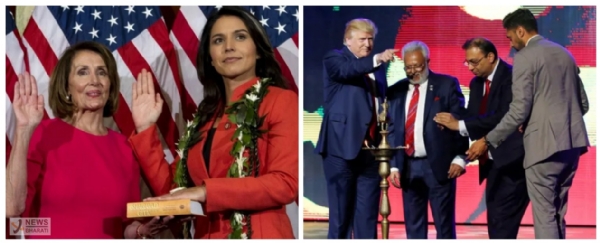Being political Hindus in the West #8: Political might of Hindus in the West
To begin with, we will start with the second largest democracy and the richest country in the world, ie. the USA.
Total Views |
In this series of Being political Hindus in the West, we discussed a few social issues which plague the Hindu communities in the West, Eg. Critical Race Theory (CRT), Critical Caste Theory (CCT), and Multiculturalism. In this and the next few articles, we will discuss the Demography of Hindus and the possible electoral power that the Hindu community wields in the West.

To begin with, we will start with the second largest democracy and the richest country in the world, ie. the USA.
The Hindu population in the United States is distributed across the country, with the largest concentrations in states with large immigrant populations, such as California, Texas, and New York. Here is a list of the states with the largest Hindu populations, according to data from the U.S. Census Bureau's American Community Survey:
California: The largest Hindu population in the United States is in California, with an estimated 581,000 Hindus as of 2020.
Texas: The second largest Hindu population in the United States is in Texas, with an estimated 269,000 Hindus as of 2020.
New York: The third largest Hindu population in the United States is in New York, with an estimated 253,000 Hindus as of 2020.
New Jersey: The fourth largest Hindu population in the United States is in New Jersey, with an estimated 191,000 Hindus as of 2020.
Illinois: The fifth largest Hindu population in the United States is in Illinois, with an estimated 173,000 Hindus as of 2020.
In Pennsylvania: The estimated Hindu population in Pennsylvania as of 2020 was about 47,000.
In Georgia: The estimated Hindu population in Georgia as of 2020 was about 27,000.
In Michigan: The estimated Hindu population in Michigan as of 2020 was about 23,000.
In Arizona: The estimated Hindu population in Arizona as of 2020 was about 17,000.
In Wisconsin: The estimated Hindu population in Wisconsin as of 2020 was about 16,000.
In New Hampshire: The estimated Hindu population in New Hampshire as of 2020 was about 6,000.
Now let us look at the last two Presidential election results, ie. 2016 and 2020, in some of the key states. In the 2016 Presidential election:
In Arizona, a state which Donal Trump won, the margin between him and Hillary Clinton was 91, 234 votes.
In Georgia, the margin was 211,141 votes.
In Michigan, the margin was 10,704 votes.
In Pennsylvania, the margin was 44, 292 votes.
In Wisconsin, the Margin was 22,748 votes.
In New Hampshire, a state which Hillary Clinton won, the margin was 2736 votes.
Now let us also look at the 2020 Presidential election:
In Arizona, a state which Joe Biden won, the margin between him and Donald Trump was 10,457 votes.
In Georgia, the margin was 11,779 votes.
In Michigan, the margin was 154,188 votes.
In Pennsylvania, the Margin was 80,855 votes.
In Wisconsin, the margin was 20,682 votes.
In New Hampshire, the margin was 59,277 votes.
Now, if we look at the Hindu population in each of these states and the last two election cycles, we can clearly see the Hindu population and the margin of victory for either party and either candidate is almost the same in either of the election. This number gives the Hindu community enormous electoral power in the Presidential elections. A decisive Hindu swing towards one party or another in these key states can swing those states in favor of one party or another, which can swing the entire election from one party to another. Note that we have not counted the big states like New York, California, Texas, Illinois, Florida, and New Jersey with much higher Hindu populations as these are either deep blue states or deep red states where the result of the election has been the same since many election cycles.
Apart from that, the Hindu community holds another Trump card up its sleeves, and that is money. The Hindu community in the USA is one of the richest communities second only to the Jewish community. This means the Hindu community can not only speak through the ballot box but also through the checkbook. Donations by the Hindu community to the key local candidates in the key states and key congressional districts can make a difference. These unique attributes of a substantial population in the key states as well as the money can help the Hindu community to navigate their interests in US politics. The only question is, Will the Hindus finally unite?


